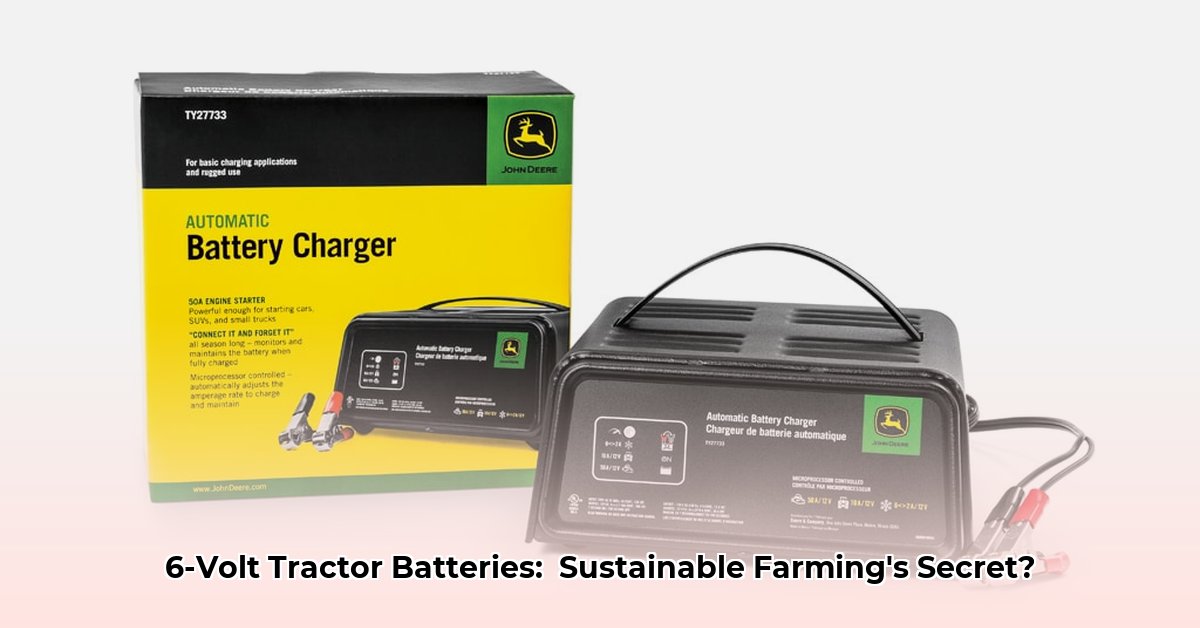
6 Volt John Deere Tractor Batteries: A Cornerstone of Sustainable Practices
Maintaining older farm equipment is crucial for sustainable agriculture. Older John Deere tractors, often powered by reliable yet aging 6-volt batteries, require specific care to maximize lifespan and minimize environmental impact. This article provides practical guidance on maintaining these batteries and considers the implications for sustainable farming. Finding your tractor's serial number is key for parts and maintenance; check here.
Understanding the 6-Volt System and its Challenges
Why 6 volts? Many older John Deere tractors utilized this lower voltage system, a testament to their robust design. However, this presents challenges: 6-volt lead-acid batteries are less efficient and require more diligent maintenance than newer lithium-ion alternatives. This necessitates a proactive approach to ensure optimal functionality and minimize environmental impact. How can we best manage these systems while improving overall farm sustainability?
Maintaining Your 6-Volt Battery: A Practical Guide
Extending the life of your 6-volt battery is key. Neglecting maintenance leads to premature failure, increasing replacement costs and downtime. Follow these crucial steps:
- Regular Inspections: Frequently inspect for corrosion (that green buildup), cracks, or loose connections. Clean terminals with a wire brush and baking soda paste.
- Fluid Level Checks (If Applicable): For batteries with removable caps, check fluid levels monthly. Add distilled water (never tap water) to maintain the correct level.
- Smart Charging: Use a 6-volt specific charger, avoiding overcharging which can damage the battery. A trickle charger is ideal for long-term maintenance.
- Off-Season Storage: Disconnect terminals during periods of inactivity to prevent slow discharge. Store the battery in a cool, dry, well-ventilated area.
- Professional Maintenance: Schedule periodic checks with an agricultural equipment specialist for early problem detection.
Environmental Responsibility: Proper Disposal is Crucial
Lead-acid batteries contain lead, a heavy metal. Responsible disposal is paramount. Always recycle used batteries through designated programs. This reduces environmental impact and aligns with sustainable farming goals.
The Transition to Higher-Voltage Systems: Embracing the Future
The agricultural sector is moving toward higher-voltage systems offering increased power and efficiency. However, the transition includes upfront cost considerations and infrastructural challenges in rural settings. However, advancements in sustainable energy technologies point toward a greener future for farming.
Comparing Battery Technologies: A Practical Analysis
| Feature | 6-Volt Lead-Acid | Higher-Voltage Lithium-Ion |
|---|---|---|
| Initial Cost | Lower | Higher |
| Lifespan | Shorter | Longer |
| Energy Storage | Lower | Significantly Higher |
| Environmental Impact | Requires careful recycling | Generally more environmentally friendly |
| Maintenance | More demanding | Less demanding |
Aren't the long-term cost savings and environmental benefits of higher-voltage systems compelling reasons to investigate the transition? What are the economic barriers preventing widespread adoption?
Maximizing 6-Volt Battery Life: Actionable Steps
While transitioning to newer technologies is important, optimizing current systems remains crucial for immediate sustainability gains. Consider these steps for maximizing your 6-volt battery's lifespan:
- Regular Cleaning: Thorough terminal cleaning (using a wire brush and baking soda paste) improves conductivity, crucial for optimal battery performance. This simple step can significantly extend battery life.
- Charging System Assessment: A faulty charging system drains the battery rapidly. Regular assessments by a mechanic are vital. A functioning alternator ensures adequate charging.
- Battery Maintainer Use: Employ a battery maintainer (trickle charger), especially for tractors frequently idle. This prevents sulfation, a destructive process reducing battery capacity.
- Wiring Upgrades: Consider heavier gauge wiring to minimize voltage drop and improve system efficiency. This enhances energy transfer and extends battery life.
The Bigger Picture: Sustainable Farming Practices
Maintaining older equipment, such as tractors with 6-volt batteries, requires a proactive and sustainable approach. Regular maintenance, responsible disposal, and a future-oriented view toward technological transitions are crucial for environmentally conscious and economically viable farming practices. The transition to higher-voltage systems presents long-term benefits, but responsible stewardship of existing equipment remains a cornerstone of sustainable agriculture.